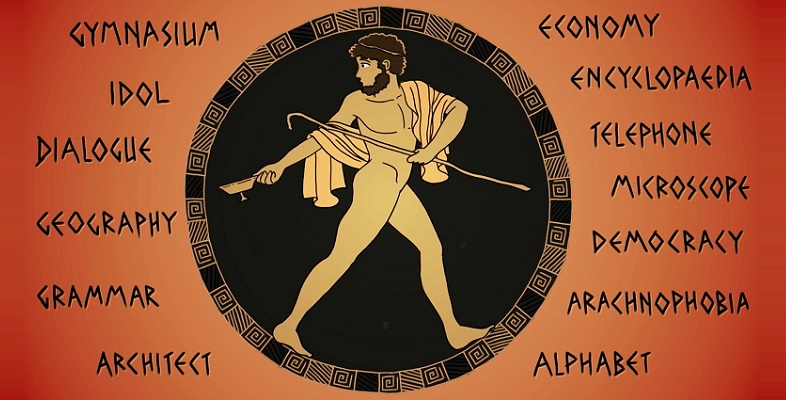5 Places and people
In this section, you get to test your knowledge of Greek letters by trying to match the ancient Greek names of various places and people with their English equivalents.
Activity 6 Pairing names
Here are some Greek place names with their English equivalents. Try to match them up, using the Greek alphabet to guide you.
Hint: the letters won’t always correspond exactly, but they are close. Any divergence will usually occur towards the end of the word. (Consider, for example, the English name for the city of ‘Munich’ with the German ‘München’.)
Using the following two lists, match each numbered item with the correct letter.
-
Athens
-
Delos
-
Thebes
-
Corinth
-
Sicily
-
Chios
a.Κορινθος
b.Χιος
c.Δηλος
d.Αθηναι
e.Σικελια
f.Θηβαι
- 1 = d
- 2 = c
- 3 = f
- 4 = a
- 5 = e
- 6 = b
Discussion
The words in brackets below are the Greek letters represented in English. These ‘transliterations’, which are helpful guides for students new to the alphabet, are presented in more detail in the next section.
- Αθηναι (Athēnai) = Athens
- Δηλος (Dēlos) = the island of Delos
- Θηβαι (Thēbai) = Thebes
- Κορινθος (Korinthos) = Corinth
- Σικελια (Sikelia) = Sicily
- Χιος (Chios) = the island of Chios
Now try to match the names of these peoples with their English equivalents. Some are easier than others, which means you might need to use a process of elimination.
Using the following two lists, match each numbered item with the correct letter.
-
Egyptians
-
Babylonians
-
Lacedaimonians
-
Persians
-
Romans
-
Phoenicians
a.Αιγυπτιοι
b.Βαβυλωνιοι
c.Περσαι
d.Λακεδαιμόνιοι
e.Ρωμαιοι
f.Φοίνικες
- 1 = a
- 2 = b
- 3 = d
- 4 = c
- 5 = e
- 6 = f
Discussion
Here are the answers with transliterations in brackets:
- Αιγυπτιοι (Aiguptioi) = Egyptians
- Βαβυλωνιοι (Babulо̄nioi) = Babylonians
- Λακεδαιμόνιοι (Lakedaiomonioi) = Lacedaimonians (= the Spartans)
- Περσαι (Persai) = Persians
- Ρωμαιοι (Rhо̄maioi) = Romans
- Φοινικες (Phoinikes) = Phoenicians
